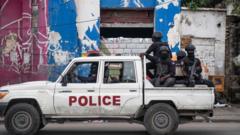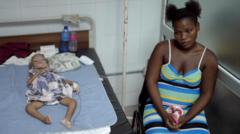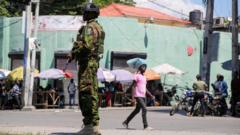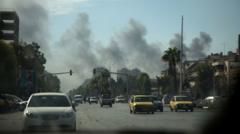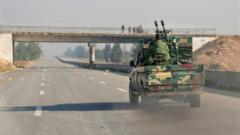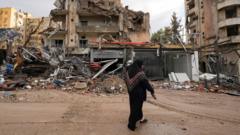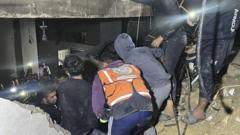The ongoing gang warfare in Haiti has led to significant humanitarian crises, including malnutrition among children and displacement of civilians. A Kenyan-led international force is on the ground to restore order, but challenges persist.**
Life Amidst Chaos: Understanding Haiti's Gang Crisis and International Response**
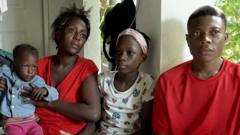
Life Amidst Chaos: Understanding Haiti's Gang Crisis and International Response**
Exploring the dire humanitarian situation and the international efforts to stabilize Haiti amid rampant gang violence.**
In Haiti's capital, Port-au-Prince, the humanitarian crisis continues to deepen due to escalating gang violence. Two-year-old Shaina is one of the 760,000 children suffering from acute malnutrition, her mother Venda fervently praying for her recovery at a hospital overwhelmed by violence and fear. With 85% of the capital under gang control, the situation has grown increasingly desperate since the assassination of President Jovenel Moïse in 2021, which triggered widespread lawlessness.
The hospital, one of the few remaining safe havens, is hardly shielded from the terror as patients, including gunshot victims like Pierre, reflect on the violence that has tarnished their lives. With an alarming death toll reported by the UN, many attribute the rise in gang membership to a lack of government support and youth programs, which have failed to capture the affections and ambitions of the nation’s young men.
In response to escalating chaos, the United Nations sanctioned the establishment of a Multinational Security Support Mission (MSS) in October 2023, with a Kenyan-led team deployed to restore peace. However, the Kenyan forces, whose numbers are far outstripped by an estimated 12,000 armed gang members, face overwhelming challenges as they patrol abandoned streets lined with barricades and the remnants of violence.
Under the command of Godfrey Otunge, efforts to stabilize the country include confronting gang fire and attempting to reclaim gang-occupied police stations. Yet, even with expected reinforcements later this year, the need for immediate assistance remains critical, as certain areas of the capital remain virtually inaccessible to law enforcement.
Haiti's society is further destabilized by gang leaders like Ti Lapli, who expresses disdain for the government while justifying their criminal actions as a means of survival in a state riddled with poverty and joblessness. Hundreds of thousands of residents, like Negociant, have been forced from their homes, seeking refuge in makeshift camps as their neighborhoods succumb to gang terror, leaving families stranded in search of safety.
As the Kenyan mission strives to restore order, optimism tempered by stark reality reflects the arduous journey ahead. The local population's yearning for peace places immense pressure on an endeavor that seeks to navigate the complexities of a nation wrestling with systemic violence and humanitarian despair.

